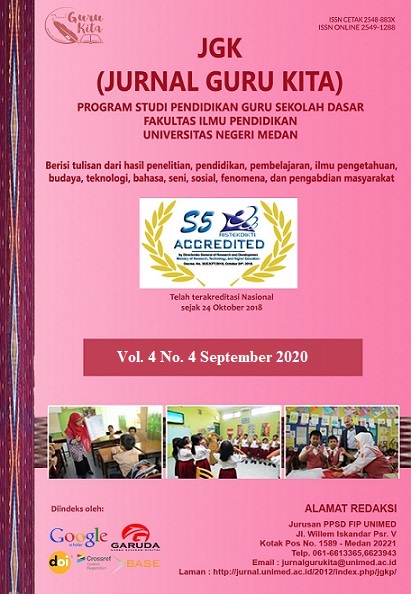THE USE OF THE DUOLINGO GUESSING GAME APPLICATION IN TEACHING SPEAKING ABILITY TOWARD 8TH - STUDENTS
DOI:
https://doi.org/10.24114/jgk.v7i1.43421Keywords:
Guessing game Duolingo, speaking ability, application DuolingoAbstract
The Use Of The Duolingo Guessing Game Application In Teaching Speaking Ability Toward 8th - Students. This study was aimed to analyze how students use the game application named Duolingo, as an English learning application, to evaluate its benefit to help students in learning English and to assess students' skills in speaking. The data for this research was collected by using post and pre-test methods in research techniques. The data source was students from SMP Muhammadiyah 1 Medan, focused on 8th grade by providing multiple-choice questions by using Duolingo Applications. The quantitative design was used in this study and the techniques for data analysis include (1) data collection procedures, (2) data analysis techniques, and (3) conclusions. Based on analysis findings, students provided improvements to English learning and they speak more smoothly with a better tone. However, learning English has a number of advantages, and since Duolingo is a form of multiple choice test so the students enjoy, and it help the problem of speaking and use repetition of words so the students can follow how to say or speak.References
Purwaningsi, Y. P. (2014). 70 English Games fun learning . Yogyakarta: CV.ANDI OFFSET
Sanders, X. W. (2021). ownership, gaming motivations, and primary/secondary control on online game addiction. Decision Support Ssytems , 144..
implementation research: An introduction. Psychiatry Research , 283.
David L. Dickinson, T. M. (2010). Rationality around the clock: Sleep and time-of-day effects on guessing game responses. Economic Letters , 245-248..
DeVries, D. E. (1990). Young children's reasoning in games of nonsocial and social logic: œTic Tac Toe and a œGuessing Game. Elsevier , 445-459.
Klimova, B. F. (2014). Games in the Teaching of English. ScienceDirect , 1157-1160.
Kotiin, S. C. (2011, November 30). Wikipedia. Retrieved June 19, 2012, from
Jeon, M. (2019). Native-English speaking teachers' experiences in East-Asian language programs. Journal Pre-proof , -.
Haoda Feng, H. L. (2021). International Perspectives on Teaching the Four Skills in ELT: Listening, Speaking, Reading, Writing, Anne Burns,. Elsevier , 102467.
Wikipedia: https://en.wikipedia.org/wiki/Duolingo
Bhandari, P. (2021, July 16). Scribbr. Retrieved june 12, 2020, from An introduction to quantitative research: https://www.scribbr.com/methodology/quantitative-r
Zhang, L. J., & Anual, S. B. (2008). The role of vocabulary in reading comprehension: The case of secondary school students learning English in Singapore. RELC Journal, 39(1), 51e76.
Downloads
Published
How to Cite
Issue
Section
License
Authors published with the JGK (Jurnal Guru Kita) agree to the following terms:
- Authors retain copyright and grant the journal the right of first publication with the work simultaneously licensed under a Creative Commons Attribution License (CC BY-SA 4.0) that allows others to share the work with an acknowledgment of the work's authorship and initial publication in this journal.
- Authors are able to enter into separate, additional contractual arrangements for the non-exclusive distribution of the journal's published version of the work (e.g., post it to an institutional repository or publish it in a book), with an acknowledgment of its initial publication in this journal.
- Authors are permitted and encouraged to post their work online (e.g., in institutional repositories or on their website) prior to and during the submission process, as it can lead to productive exchanges, as well as earlier and greater citation of published work. (See The Effect of Open Access)













